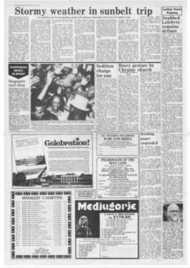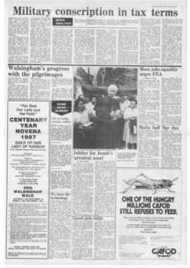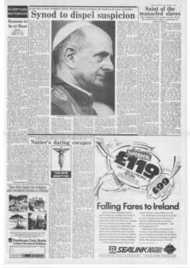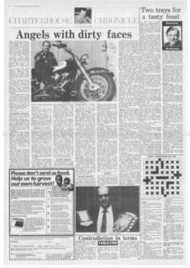Page 5, 4th September 1987
Page 5

Report an error
Noticed an error on this page?If you've noticed an error in this article please click here to report it.
Tags
Share
Related articles
One By One Tidiest Thoughts Heroes Died
Strange History Of Valladolid
Sixtus' Reluctant Alliance With Spain Led To Sad Demise...
Laity Hid Their Hunted Priests
The Shattered Province
Nutter's daring escapes
THE NEW MARTYRS
INTERMITTENT hostilities between England and Spain continued for many years after the Armada campaign, and in 1600 there were still numerous priests in the concentration camp at Wisbech. Among them was Ven Thomas Hunt, a 23-year-old Norfolk man, one of the first students at the newly opened College in Seville, where he had been ordained in 1599.
Sailing from San Lucar for France, he then crossed to England and was found lodgings by Fr Henry Garnet, the Jesuit Superior, but, through an indiscreet conversation, was betrayed and sent to Wisbech. With five others, including Ven Robert Nutter, he escaped, and communicated to Garnet the truth about the Wisbech Stir, an alleged quarrel between the supporters of the Jesuits, and other prisoners, which was in reality the work of a treacherous priest, Dr Christopher Bagshaw, planted among the captives by Sir Robert Cecil.
Garnet arranged for Hunt to travel with Ven Thomas Sprott, a native of Skelmsmergh near Kendal, who had studied at Douai, been ordained there in 1596, and sent immediately on mission. Arrested at Brielle in Holland, by the Governor, Captain Turner, and sent a prisoner to the London Bridewell, he soon escaped and, aided by Fr Garnet, was at liberty for three years.
Hunt and Sprott were staying at the Saracen's Head in Lincoln, when the watch, searching for thieves, raided it and arrested them on suspicion.
Their baggage being searched, holy oils and breviaries were found; they were closely questioned, but neither confirmed nor denied their priesthood. Held until the Summer Assize, then indicted for priesthood, they found the jury reluctant to convict, as no evidence was offered, but the judge insisted on a guilty verdict.
At the scaffold in Lincoln on July 1, 1600, both attempted to address the crowd, which was sympathetic, but were prevented. A layman, William Smith, who called out that they died only for conscience, was promptly arrested. The multitude insisted that the martyrs should hang until dead to avoid the sufferings of mutilation.
Robert Nutter had survived many adventures before being sent to Wisbech. Born at Burnley, Lancashire, and educated at the Grammar School, where one of the masters, Lawrence Yates, was a secret Catholic, he went to Rheims in 1579 with his elder brother, Bl John Nutter. Ordained in 1582, concelebrating his first Mass with Ven George Haydock, he returned to England the same year, but in February 1584 both brothers were in the Tower.
John was executed, and Robert, after spending 47 days in a dungeon and being tortured, was released, in the hope that he would, unwittingly, reveal Catholic houses. Re-arrested the same year, he, with others, was transported, the execution of Haydock having been so brutal that the Privy Council, to appear merciful in French eyes, cancelled a number of death sentences.
At sea the transportees mutinied, Nutter arguing, unsuccessfully, that it was contrary to the law for the Queen's subjects to be banished without trial. When he reached Paris he was befriended by the Spanish ambassador, then returned to England as escort to newly ordained priests from France.
When the party was brought ashore at Gravesend, Nutter gave his name as Rowley, but was recognised and sent to Wisbech. There, under a new keeper, conditions improved,' enabling the inmates to set up a library, live the religious life, give pre-seminary training to the boys who waited on them, and, as recent research into Cecil's papers has revealed, Fr Nutter was admitted to the Dominican order.
On March 10, 1600, the keeper having left the gate. unlocked, Nutter and his companions made their escape.
Some were never recaptured, but those who headed south were taken, and Nutter was sent to Lancaster, where the Privy Council was holding Ven, Edward Thwing (a member of the well-known Catholic family to which St John of Bridlington and B1 Thomas Thwing also belonged). Born at Heworth Hall in 1560, Edward studied in Rome and was professor of Hebrew and Greek at Rheims.
Ordained at Laon in 1597, he joined the mission in Lancashire the same year and worked for three years before being imprisoned in Lancaster. Much of his life he suffered from an incurable ulcer on his knee, but made light of it, and two cheerful letters, written from prison to Dr Worthington, President of Douai, are evidence of his invincible courage.
He was executed in Lancaster on July 26, 1600 with Fr Nutter, of whom it was said: `he despised death rather than conquered it.'
blog comments powered by Disqus











